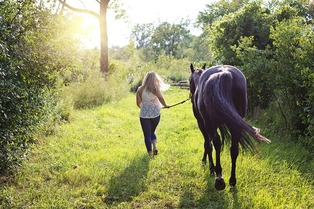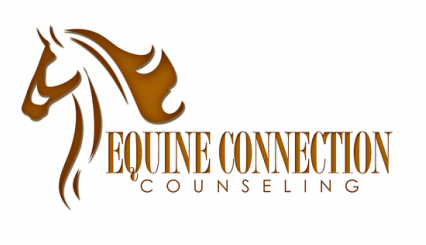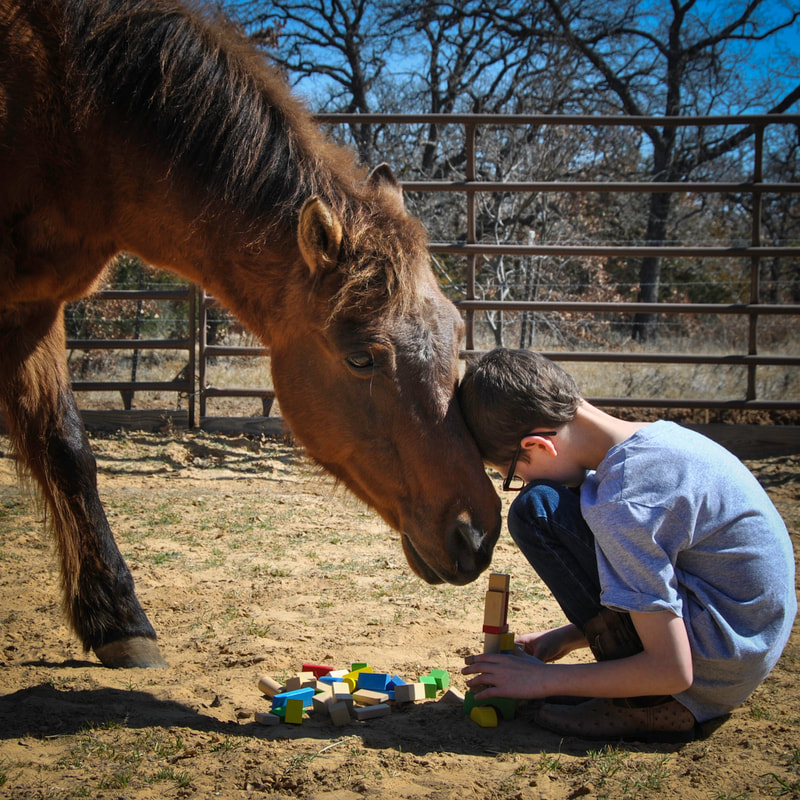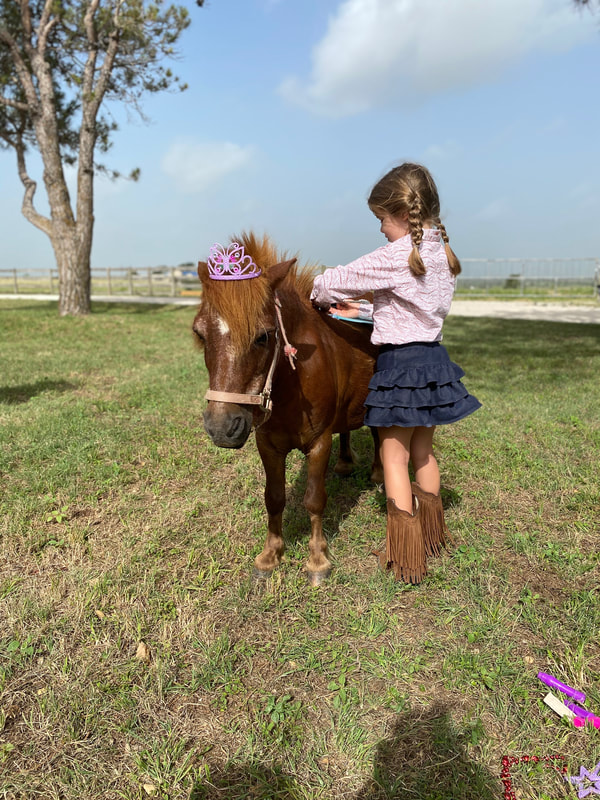Equine Connection Counseling's approaches, Relational Equine-Partnered Counseling and Equine-Partnered Play Therapy, are intended for the practice of psychotherapy and/or counseling. Therefore, these approaches must be directly facilitated by a licensed mental health professional and qualified equine specialilst. In special cases, individuals who are dually-credentialed and qualified may be permitted to assume both roles.
Relational Equine-Partnered Counseling (REPC)

The REPC approach is intended for older children, adolescents, and adults and can be used in individual, couple/marital, family, and group formats.
This approach is integrative, evidence-informed, and trans-theoretical, enabling clinicians of all counseling theories to integrate REPC into their unique practice.
This approach is based on four philosophical principles:
1) The power of experience and creation of meaning
2) The power of the therapeutic relationship for both humans and equines
3) Emphasis on interpersonal/species neurobiology and physiological processes
4) Acceptance of the client's spiritual/transpersonal experiences while in relationship with equines
Our fundamental belief is that each client possesses an inherent tendency to seek meaningful relationships through which they can move towards growth and healing. Through relationships with equines, clients experience the security necessary to explore concerns on a deeper level and create new relationship patterns. The client's relationship with the equine serves as a microcosm of the client's world and subsequently a conduit through which he or she can gain insight.
We believe in the capacity of the equines themselves to be self-directed and capable of assisting the client in gaining insight. As prey animals, equines are highly attuned to their environment (including the people in it). This high level of attunement enables equines to be fully present in every moment and model awareness and mindfulness. In addition, equines naturally embody certain qualities such as being authentic, nonjudgmental, and empathic thus enabling them to be true therapeutic partners.
Our approach is focused on groundwork in which structured activities, teaching, and horsemanship are de-emphasized. Instead, much of our work takes place in the pasture where the client has access to multiple equines who are permitted to respond naturally and organically in the moment.
The Relational Equine-Partnered Counseling approach has been used in over 6,000 equine assisted counseling sessions with diverse clients and presenting concerns. More specifically, this approach has been shown to be beneficial in reducing distress related to posttraumatic stress (Sheade, 2015). Clinicians using REPC have found that 82% of service members with PTSD experience improvement (in comparison to 50-60% who improve using other office-based, evidence-based therapies). Additionally, only 11% of service member clients drop out before completing 8 or more EAC sessions (in comparison to 20-50% who drop out from other office-based, evidenced-based therapies).
The REPC approach has been feature in world-renowned expert in animal-assisted therapy in counseling, Dr. Cynthia Chandler's newest book, Animal-Assisted Therapy in Counseling. The REPC approach is featured in detail throughout Dr. Sheade's book, Equine-Assisted Counseling and Psychotherapy: Healing Through Horses, available for purchase.
This approach is integrative, evidence-informed, and trans-theoretical, enabling clinicians of all counseling theories to integrate REPC into their unique practice.
This approach is based on four philosophical principles:
1) The power of experience and creation of meaning
2) The power of the therapeutic relationship for both humans and equines
3) Emphasis on interpersonal/species neurobiology and physiological processes
4) Acceptance of the client's spiritual/transpersonal experiences while in relationship with equines
Our fundamental belief is that each client possesses an inherent tendency to seek meaningful relationships through which they can move towards growth and healing. Through relationships with equines, clients experience the security necessary to explore concerns on a deeper level and create new relationship patterns. The client's relationship with the equine serves as a microcosm of the client's world and subsequently a conduit through which he or she can gain insight.
We believe in the capacity of the equines themselves to be self-directed and capable of assisting the client in gaining insight. As prey animals, equines are highly attuned to their environment (including the people in it). This high level of attunement enables equines to be fully present in every moment and model awareness and mindfulness. In addition, equines naturally embody certain qualities such as being authentic, nonjudgmental, and empathic thus enabling them to be true therapeutic partners.
Our approach is focused on groundwork in which structured activities, teaching, and horsemanship are de-emphasized. Instead, much of our work takes place in the pasture where the client has access to multiple equines who are permitted to respond naturally and organically in the moment.
The Relational Equine-Partnered Counseling approach has been used in over 6,000 equine assisted counseling sessions with diverse clients and presenting concerns. More specifically, this approach has been shown to be beneficial in reducing distress related to posttraumatic stress (Sheade, 2015). Clinicians using REPC have found that 82% of service members with PTSD experience improvement (in comparison to 50-60% who improve using other office-based, evidence-based therapies). Additionally, only 11% of service member clients drop out before completing 8 or more EAC sessions (in comparison to 20-50% who drop out from other office-based, evidenced-based therapies).
The REPC approach has been feature in world-renowned expert in animal-assisted therapy in counseling, Dr. Cynthia Chandler's newest book, Animal-Assisted Therapy in Counseling. The REPC approach is featured in detail throughout Dr. Sheade's book, Equine-Assisted Counseling and Psychotherapy: Healing Through Horses, available for purchase.
Equine-Partnered Play Therapy (EPPT)
|
Equine-Partnered Play Therapy (EPPT) is the integration of equines with child-centered play therapy (CCPT). Garry Landreth's model of CCPT serves as the foundation for EPPT.
CCPT is an evidence-based approach and is based on the belief that, unlike talk therapy for adults, children understand and make meaning of their world through play. In this way, play is a child's language with toys being the words that a child uses to express himself or herself. In EPPT, we strive to create a safe and permissive environment for children to express themselves freely. We do not direct a child's play, instead allowing them to be self-directed in determining the nature of their play and interaction with the equines. Many children have an innate curiosity about animals and prefer to interact with real animals rather than animal toys. In addition, the presence of the equine grounds the session in reality and can enable a child to feel more at ease and secure during a play session. The equine is capable of providing genuine feedback to the child and also serves as a medium through which the child may express feelings. One of the most important benefits to children in EPPT is the opportunity to both provide and receive nurturing while interacting with the equine. Using the principles of CCPT, we have developed a play area modeled after a traditional playroom with additional toys/materials for a child to use in connecting with an equine. We have also added to the repertoire of traditional child-centered facilitative responses to include responses reflecting the equine's role as a group member and the relationship between the equine and child. Finally, as limit-setting can be challenging even in traditional play therapy, the integration of equines into play therapy adds additional layers of complexity and ambiguity. We have therefore developed methods to apply traditional CCPT limit-setting to the unique circumstances that arise in EPPT. |
The EPPT approach has been feature in world-renowned expert in animal-assisted therapy in counseling, Dr. Cynthia Chandler's newest book, Animal-Assisted Therapy in Counseling. The EPPT approach has also been featured in Dr. Kay Trotter's and Dr. Jennifer Baggerly's book, Equine-Assisted Mental Health: Harnessing Solutions to Common Problems. The EPPT approach is also highlighted in detail in Dr. Sheade's book, Equine-Assisted Counseling and Psychotherapy: Healing Through Horses, published in August 2020.
What is the difference between REPT and EPPT?
|
Relational Equine-Partnered Counseling (REPC)
* Experiential talk therapy with some structured activities * Best suited for older children, adolescents, and adults * Takes place in pasture or pen * Incorporates equines of all sizes * Utilized with individuals, couples, families, and groups |
Equine-Partnered Play Therapy (EPPT)
* Nondirective play therapy * Best suited for young children (ages 3-9) * Takes place in play therapy area * Limited to miniature equines * Utilized with individuals, families, and small groups Read more about EPPT here. |
Competency Standards to Practice REPC and EPPT
Licensed mental health professionals are required to demonstrate competence to provide modalities used in practice. Competency to practice a new modality in counseling or psychotherapy is generally recognized as having completed formalized training followed by supervised experience. The competency standards for REPC and EPPT are outlined below:
|
Relational Equine-Partnered Counseling
Competency standards for mental health professionals
Competency standards for equine professionals:
|
Equine Partnered Play Therapy
Competency standards for mental health professionals
Competency standards for equine professionals:
|
Licensed mental health professionals who are independently licensed and meet the above standards may be eligible for recognition as an ECC Approved Provider. Contact us to learn more about becoming an Approved Provider!



